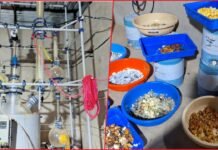
Key Points
- Rajasthan Tragedy: At least seven children were killed and over 30 injured after the roof of a dilapidated government school collapsed in Piplodi village, Jhalawar, on Friday morning.
- Warnings Ignored: The collapse occurred during morning prayers after heavy rains weakened the structure; villagers allege their repeated complaints about the building’s unsafe condition were ignored.
- A Haunting Echo: The incident has drawn comparisons to the horrific 2013 mid-day meal poisoning in Chhapra, Bihar, where 23 schoolchildren died.
- Bihar Tragedy Aftermath: The 2013 deaths were caused by pesticide-laced cooking oil. The school’s headmistress was later found guilty and sentenced to 17 years in prison.
Jhalawar: A devastating tragedy struck the village of Piplodi in Rajasthan’s Jhalawar district on Friday, when the roof of a government primary school collapsed, killing at least seven students and injuring more than 30 others. The incident occurred around 8:30 AM as children had gathered for their morning assembly.
Continuous heavy rainfall had reportedly weakened the already dilapidated school building, leading to its sudden collapse. Scenes of chaos and panic erupted as villagers and school staff frantically dug through the rubble with their bare hands to rescue the trapped children before official rescue teams arrived. The injured were rushed to nearby hospitals, with at least four reported to be in critical condition.
Local residents expressed outrage, claiming they had repeatedly warned the administration about the dangerous condition of the school building, but no action was taken. Prime Minister Narendra Modi called the incident “tragic and deeply saddening,” while Rajasthan’s Chief Minister Bhajanlal Sharma announced a high-level investigation and assured that the state would cover all medical expenses for the injured.
Echoes of a Past Horror: The Chhapra Mid-Day Meal Poisoning
For many across India, the tragedy in Rajasthan is a grim and painful reminder of another horrific incident that occurred over a decade ago. On July 16, 2013, the nation was shaken when 23 schoolchildren at a primary school in Gandaman village, Chhapra, Bihar, died after eating a poisoned mid-day meal.
The children, aged between four and twelve, fell violently ill with vomiting and stomach cramps just minutes after consuming their lunch of rice and soybean curry. An investigation later revealed that the meal had been cooked with oil contaminated with a highly toxic pesticide, organophosphorus.
A Story of Criminal Negligence
The investigation into the Chhapra tragedy uncovered a shocking case of gross negligence. The school’s headmistress, Meena Devi, had procured the cooking oil from her husband’s shop. The school’s cook had alerted the headmistress that the oil smelled foul and looked discolored, but she was ordered to use it anyway.
The deaths triggered widespread protests across Bihar, with furious parents and villagers demanding justice. The headmistress and her husband initially fled but were apprehended weeks later. In 2016, Meena Devi was found guilty of culpable homicide not amounting to murder and sentenced to 17 years in prison, bringing a measure of accountability to a tragedy that had scarred the nation.
The school in Gandaman has since been rebuilt, and the mid-day meal scheme has undergone reforms. However, as the recent events in Rajasthan show, the fundamental issue of ensuring the safety of children in India’s schools remains a critical and, at times, tragically unaddressed challenge.











































